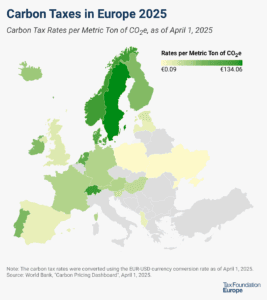
New Study Debunks European Commission Claims Justifying New Taxes on Digital Companies
5 min readBy:At this week’s meeting of G20 leaders in Argentina, one of the most discussed topics will be the taxation of digital companies. Indeed, Angel Gurría, the Secretary-General of the Organisation for Economic Cooperation and Development (OECD), will brief the assembled finance ministers on the OECD’s Interim Report on the Tax Challenges Arising from Digitalisation. The report details the difficulty of applying traditional corporate tax systems to digital commerce, but also reveals a lack of unanimity of the member countries on how—or even the need—to address the issue.
Despite the lack of unanimity, the European Commission, along with a small group of European countries such as France and Germany, want to press ahead with special taxes aimed at the largest digital companies. They’ve typically justified these targeted taxes, such as a turnover taxA tax is a mandatory payment or charge collected by local, state, and national governments from individuals or businesses to cover the costs of general government services, goods, and activities. , on the basis that large digital companies are not paying their “fair share” of taxes in each country.
However, a new study, Digital Companies and Their Fair Share of Taxes: Myths and Misconceptions, by Dr. Matthias Bauer at the European Centre for International Political Economy (ECIPE) challenges these claims. It first looks to see if there has been any long-term decline in corporate tax revenues resulting from any sort of base-erosion, and then uses company financial data to compare the profit margins and effective tax rates of digital companies to non-digital companies. Bauer finds that the data does not support the European Commission’s claims that digital companies are under-taxed or that tax collections have slumped as a result.
Little Sign of Slumping Corporate Tax Revenues in the EU
Bauer documents that for the European Union (EU) as a whole, tax revenue collections have outpaced the growth in the economy for the past two decades. Since 1995, GDP in the EU grew by 103 percent, while overall revenues grew by 119 percent. During the same period, corporate tax revenues grew by 147 percent–far faster than the overall growth in the economy–although, Bauer does acknowledge that corporate revenues slowed more recently following the Great Recession.
As a share of the economy, corporate revenues have changed little over the past 20 years, despite an EU-wide reduction in corporate tax rates. In 2016, corporate tax revenues in the EU comprised 2.9 percent of GDP, compared to 3.0 percent in 2005 and 2.8 percent in 1995, showing little evidence of massive tax avoidance.
Based on this data, Bauer concludes:
Consequently, views about “tax base erosion in the EU” as a whole are exaggerated, and the same verdict is true for the statement that the rise of the digital economy has exacerbated corporate tax baseThe tax base is the total amount of income, property, assets, consumption, transactions, or other economic activity subject to taxation by a tax authority. A narrow tax base is non-neutral and inefficient. A broad tax base reduces tax administration costs and allows more revenue to be raised at lower rates. erosion. EU countries’ tax data rather indicate that the digitisation of the economy has, overall, not impacted tax revenues and base erosion. In addition, it should also be noted that even if EU Member States were able to collect the total taxes paid by the world’s largest digital corporations, the amount collected would not make an impact on the sustainability of public finances in the EU. (p. 5)
Digital Firms Have Comparable Margins and Tax Rates as Non-Digital Firms
In many of its recent communications on digital commerce, the European Commission has justified targeted taxes on large digital companies based on studies showing that “companies with ‘digital international B2C models’ and ‘digital international B2B models’ show average tax rates of 10.1 percent and 8.9 percent.” (p. 7) It appears, however, that these estimates are based on stylized, or “hypothetical,” investment projects, rather than actual industry financial data.
Using real-world financial data, Bauer compared the profit margins and effective corporate tax rates (ECTRs) paid by digital companies to the profit margins and ECTRs paid by non-digital companies, finding little difference between the sectors over both three- and five-year averages.
The nearby table summarizes the findings. Looking at the five year averages for traditional corporations, for example, we can see that they had average profit margins of 10.6 percent and average ECTRs of 27.1 percent. By contrast, digital companies (which include Alphabet, Amazon, Facebook, and Microsoft) had slightly higher profit margins of 17.4 percent, but also had average ECTRs of 26.8 percent over a 5-year period.
Similarly, the profit margins of MSCI digital services companies (which include Accenture, Adobe Systems, CA inc., IBM, and Paypal) averaged 15.2 percent, slightly higher than traditional corporations, but their average ECTRs of 29.4 percent were also higher than the traditional firms. The last row in the table provides the averages for all digital companies and shows that while their profit margins may be higher than traditional companies, their average ECTRs are also higher.
The fact that firms with higher profit margins have higher ECTRs shows that the tax systems must be working as intended.
| 5 Year Averages | 3 Year Averages | |||
|---|---|---|---|---|
| Average Profit Margin | Average ECTR | Average Profit Margin | Average ECTR | |
| Source: European Centre for International Political Economy | ||||
|
Traditional Corporations (EuroStoxx50) |
10.60% | 27.10% | 11.40% | 26.70% |
|
Digital Group Corporations |
17.40% | 26.80% | 17.20% | 28.10% |
|
MSCI Digital Services Corporations |
15.20% | 29.40% | 15.10% | 32% |
|
Digital Corporations (The Digital Group and MSCI Digital Services Corporations) |
15.50% | 29.10% | 15.40% | 31.50% |
Not all Digital Companies are High-Flyers
Bauer makes the important point that while there are certainly some large and successful digital firms, it is a mistake to think that all digital firms are at the same stage of maturity. Indeed, many digital firms run operating losses for years as they build their customer base and grow their market share.
Bauer explains:
Policymakers should take into account that scale is an important driver of the profitability of many B2B and B2C digital business models, particularly in e-commerce and in the provision of platform-based digital services. Generally, companies can focus on growing revenues at the expense of margins, or margins at the expense of revenues. Indeed, many digital companies invest in long-tail value drivers to increase and sustain revenues and, after all, to make profits. These include investments in IT and software technology, advertising and product diversification to increase customer value-added and, in turn, subscription and membership numbers. These types of investment explain often low or negative profit margins of both big and small digital companies.
Conclusion
Bauer concludes by reminding policymakers that their proposed targeted taxes on digital companies threaten the future of the European economy. “[R]ecent proposals in Europe to slap a targeted tax on digital revenues clash with the EU’s top policy priorities for the digital economy. It is therefore remarkable that such taxes even are considered. A tax on digital revenues would not only stand in opposition to tax efficiency and neutrality; it would also undermine digitalisation, European integration, and the Digital Single Market.”
Share this article




